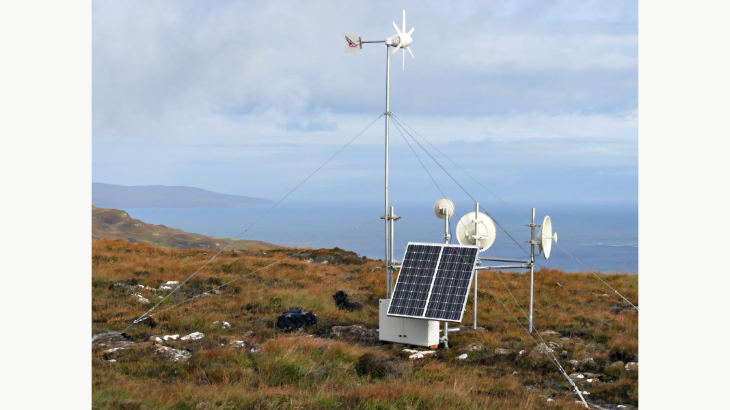Marlec Engineering – The Winds of Change

It all started in a field in Rutland. Back in the 1970s, a Rutland farmer was struggling to keep the batteries for his electric fences charged up, so he asked John Fawkes, a retired engineer, to come up with a solution. The Rutland Windcharger was born – a simple, reliable, quiet, and efficient wind-driven battery charging generator. Since then, over 125,000 wind turbines have been manufactured by the business, now trading as Marlec Engineering, along with a wide variety of other renewable energy products and solutions. John Fawkes went on to be bestowed with a Wind Energy Pioneer Award and family members continued to be associated with Marlec until very recently.
Today Marlec Engineering, based in Corby, employs around 30 people locally in the factory where they manufacture many of their products. They have achieved local recognition of their efforts in sustainability, last and this year as Finalists for the Sustainability Award and last year’s winner of The Pinnacle Award at the Northamptonshire Business Awards. They are committed to providing opportunities for employment within the county and purposefully aim to use local manufacturers to supplement their product range. The blades for their small wind turbines are made by a plastics manufacturer based 8 miles away. All their castings are made by a company in Leicester. NorVolt, based in Northamptonshire, are an approved local installer of Marlec’s Veva EV charger. They are also able to work with local colleges and institutions teaching the fundamentals of renewable energy.
Marlec sell a wide range of products and consequently have a wide range of clients, from individuals to central government.
For individuals
The energy price hikes over the past few years have resulted in demand from homeowners wanting to invest in solar panels and VEVA EV chargers to independently power their homes and electric cars. Following the COVID pandemic there has been an increase in staycations and a resulting surge in demand for leisure vehicles, caravans, campervans and boats. Marlec’s windchargers and solar panels enable holiday makers to generate wind and solar power wherever they are, saving on fuel consumption and allowing for greater freedom.
For businesses
Many businesses are keen to take steps not only to reduce their energy consumption and consequently their utility bills but also to reduce their carbon footprint, and consequently make use of Marlec’s renewable power technology. Marlec is involved in Decode Corby – a project led by Community Interest Company Electric Places, and set up to help decarbonise the local manufacturing industry in North Northamptonshire. Marlec’s role is to show how implementing the correct eco measures can dramatically reduce a business’s carbon footprint. Marlec shares its expertise and experience in providing renewable solutions to support the project partners in developing and implementing the decarbonisation plan. Together with one of their sister companies ISO Solar, they offer a free site survey and an installation discount to interested businesses. For readers interested in finding out more about Decode Corby and Electric Places, read CA-WN’s September Monthly Meeting notes which featured guest speaker Tim O’Callaghan.
Marlec also designs off-grid wind and solar packages for ultimate clients such as Network Rail who need a source of power in far-flung locations up and down the country, providing track lubrication systems across the network.
For local authorities, local utility companies and central government
The same can be said for local authorities and community organisations who may need off-grid renewable energy for street lighting, signage and CCTV. The UK has one of the most substantial legal frameworks and policy framework designed to ensure the UK reaches Net Zero emissions by 2050. The UK government recently introduced legislation demanding water companies monitor the flow of water, water quality and amount of sewage into rivers. In order to do this the water companies need power in remote locations far from the electricity grid and this is where Marlec come in, building combinations of wind and solar solutions.
Operationally within the business itself, Marlec walks the talk. They utilise solar panels to power the factory, offer EV charging in the company car park, all their lighting uses LED technology, and they take care to be sustainable wherever they can, right down to sourcing bamboo toilet roll not just because it’s the right thing to do, but because it represents efficient business practice. Marlec boasts a loyal and committed workforce. Their average tenure of employee is 13 years. At the entry level, Marlec is looking to offer an apprenticeship role for a young person based locally. In terms of waste, Marlec send next to nothing to landfill which is impressive for a manufacturing company. They try to enable customers to keep their products well-maintained and long-lasting to avoid them being discarded. Of the 125,000 wind turbines made over the years, most are still in operation with spares at the factory if needed and online support videos for the layperson to fix their own products. Often an entire wind turbine manufactured way back in the early 1990s can be found on the factory floor covered in moss and algae, returned to the factory for repairs. All packaging is fully recyclable, and in the production process, offcuts of metals are recycled wherever possible.
From the beginning to today, Marlec has been designing and engineering solutions to cater to a wide range of renewable energy needs. As a leader in innovation and sustainability, manufacturing products for a global client base, Marlec looks set to benefit from the race to net zero, but still retains its humble, local roots.

